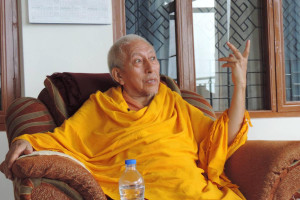
By S Gopal Puri | TNN
DHARAMSHALA, India, 21 March 2016
There are signs of resentment against the way elections are being fought for the top democratic post of the Tibetan government in exile. On a day when nearly 90,000 exiled Tibetans voted to elect their new leader for sustaining the demand for a free Tibet, the first elected head of the exiled government, Samdhong Rinpoche, refused to cast his vote, giving the argument that the entire election process was moving away from the ideals of a party-less democracy .
Samdhong Rinpoche, 77, who fled Tibet just four days after the Dalai Lama, said he was hurt by the practices being adopted by exiled Tibetan leaders to compete in the elections.
“I didn’t cast my vote as the exiled government was based on the principles of Swaraj of [Mahatma] Gandhi Ji. It didn’t involve competition or opposition. But, nowadays, representatives are involved in opposing each other through their individual campaigns. Therefore, I think, the exiled government is not heading in the right direction,“ Rinpoche told TOI over the phone from Mysore.
Rinpoche was first elected the Kalon Tripa (head of the Tibetan cabinet in exile) in 2001. The post is now known as that of the Sikyong, or prime minister. “I had left Tibet on March 21, four days after the Dalai Lama fled to India on 17 March 1959,“ he said.
The post of Sikyong was a low-profile role before the 80-year-old Dalai Lama devolved power in an attempt to lessen his own status and foster a democratic set-up to keep Tibet’s freedom movement alive after his death.
Rinpoche said the views on how the elections were being fought were his own. “The next generations of Tibetans, however, must know that the exiled set-up, which was founded in April 1959, was based on the principles of co-operation and not of competition. The practices being adopted by our contenders now are the same as regular political parties. These are not going to benefit in any way,“ he said.












